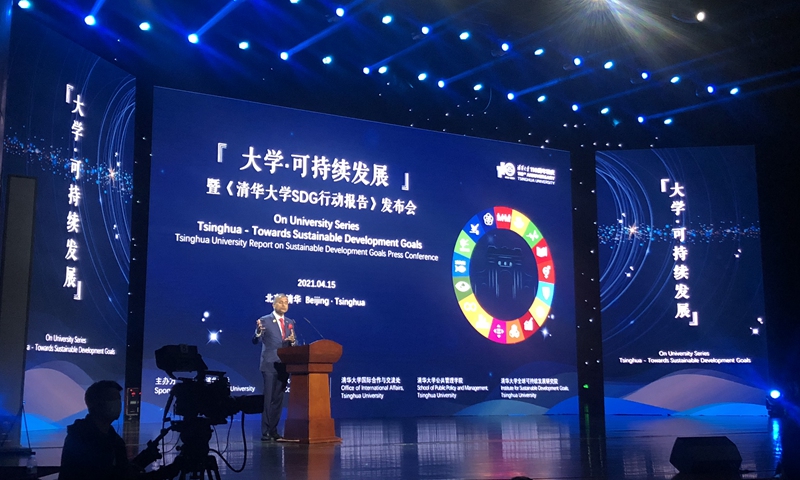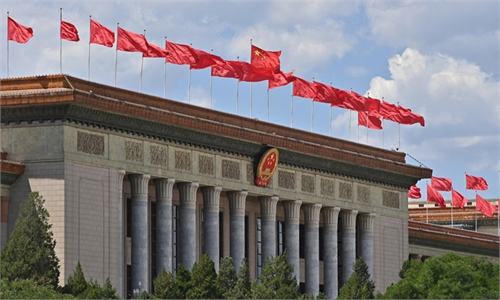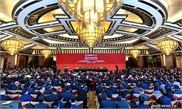China’s Tsinghua University launches its SDGs report, determined to cultivate more talents for the world

Tsinghua University hosts the University Sustainable Development Forum on April 15. Photo: Li Qiao/GT
China's Tsinghua University hosted the University Sustainable Development Forum and launched its Sustainable Development Goals (SDGs) Report on Thursday night in Beijing.
"The fundamental function of a university is to cultivate talents. Without talents, there is no foundation for achieving SDGs," Wu Hongbo, China's Special Representative for European Affairs, and former Under-Secretary-General of the United Nations, said on the forum.
Zhu Xufeng, Executive Director of the Institute for SDGs of Tsinghua University, told the Global Times that colleges and universities could promote sustainable development in the process of campus construction, through personnel training, scientific research, social services, cultural inheritance, innovation and international exchanges, and cooperation to achieve the SDGs. At the same time, constructing a green campus will improve the sustainable development of the university with a more comprehensive development concept.
Since the promulgation of the 2030 Agenda for Sustainable Development and China's National Plan for the Implementation of the 2030 Agenda, Tsinghua University has actively responded to the call of the country and the United Nations and worked hard to promote the realization of the SDGs on campus, at home and abroad, Zhu said.
According to Tsinghua's SDGs Action Report, in 2020 the university opened 2,317 SDGs courses, held 20,665 SDGs student activities and organized 408 SDGs social training programs, with a total of 55,557 participants. It has carried out 9,253 SDGs research projects, obtained 10,059 national and foreign patents, and released a total of 49,289 pieces of SDGs news to the public.
In terms of talent cultivation for SDGs, Tsinghua University and the University of Geneva jointly set up a dual master's degree program in English on Public Policy for Sustainable Development. The first MPP-SDG double master's graduates will receive their degree in 2021.
The realization of SDGs requires the cooperation of various parties and the active involvement of more outstanding talents in this field. Wu expects that Chinese universities, represented by Tsinghua University, can cultivate more interdisciplinary and creative talents, to face the world and the future, and support the SDGs.
Jeffrey Sachs, Professor of Columbia University and President of the SDGs Network of the United Nations, attended the forum through video. He stressed that higher education institutions play an important role in the cultivation of talents, scientific innovation and social participation of a country, and that higher education institutions themselves should shoulder corresponding responsibilities in the face of important international issues.
"More than ever, as we battle COVID-19, as we face climate change crises, as we face the need to conserve biodiversity, to lower and stop pollution, and to make our societies prosper and fair for all people, Tsinghua's role will be growing and growing as well as its historical significance," Professor Jeffery noted.
Amid the COVID-19 pandemic, on April 2, 2020, Tsinghua University established the Vanke School of Public Health. This decision by the university will provide strong support to the national epidemic prevention and control, the construction of public health emergency response system, and cultivate high-level talents to lead the development of international public health in the future.
Margaret Chan Fung Fu-chun, Inaugural Dean of Vanke School of Public Health of Tsinghua University, and Emeritus Director-General of the World Health Organization, said at the forum that, although many countries have made much progress in public health in recent years, global health still faces many challenges. Addressing these challenges will require governments to work together to improve public health and reform healthcare systems.
"China has done a good job in the epidemic prevention and control because of its adherence to the people-centered development philosophy. It is easy to say, but not easy to do. The right to life and the right to health are fundamental human rights. COVID-19 allowed us to see what the country offered to every citizen. Everyone also has a responsibility to take care of their own personal health," she noted.
She believes that Tsinghua can further leverage its talents and technological advantages in the future development of major national public health policies and in addressing major global public health issues.
The pandemic hampered and disrupted the promotion of SDGs considerably. Experts pleaded that global cooperation is the most urgent requirement.
"Strengthening international cooperation and reducing the epidemic through scientific and technological innovation are very important to realize the SDGs at the moment," He Kebin, a professor of the School of Environment of Tsinghua University, said at the forum.



